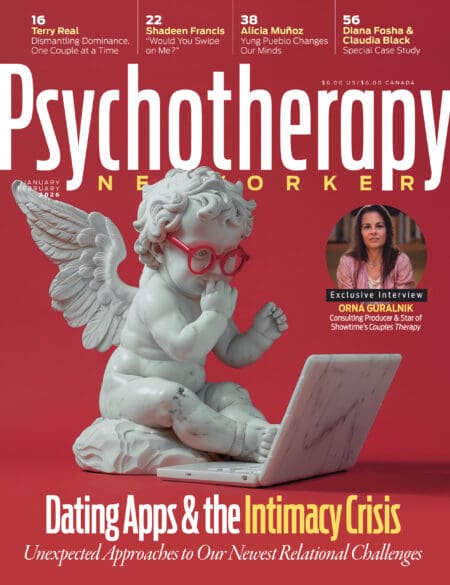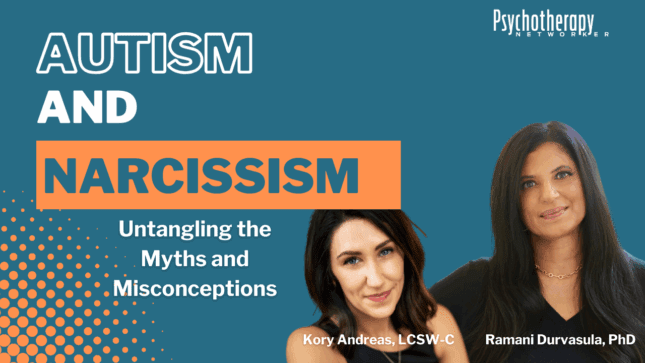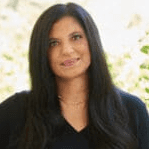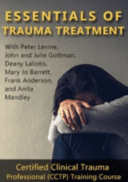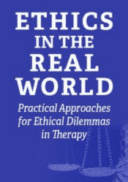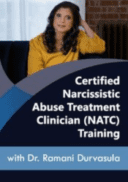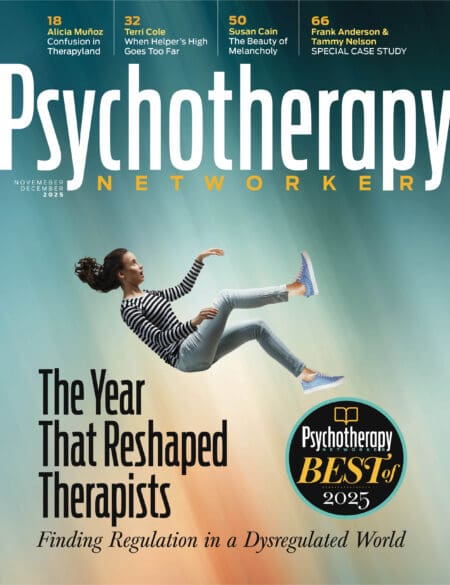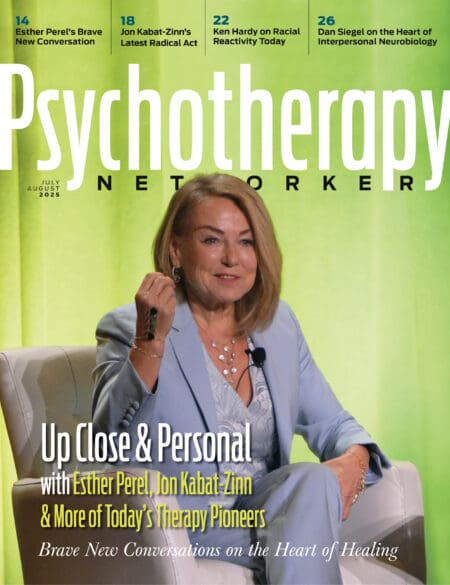Enjoy the audio preview version of this article—perfect for listening on the go.
You’re about to hear a discussion between Dr. Ramani Durvasula, a leading expert in narcissism and narcissistic abuse, and Kory Andreas, a leading expert in autism and neurodivergent couples.
Some of you are probably wondering why we’re even exploring autism and narcissism in the same conversation. Other than both being words that are growing more and more ubiquitous in our culture, they have nothing to do with one another: one is a neurotype that exists on a spectrum with vast presentations of its challenges and strengths, and the other is an antagonistic personality style that’s hugely damaging to relationships.
So why are these two experts, with such very different clinical specialties, coming together to meet today? The answer is that they’re both concerned about the confusion they’re seeing around certain behaviors that can be damaging for relational partners but have very different root causes and very different prospects for change.
In her neurodivergent couples therapy practice, Kory Andreas is seeing a lot of partners of autistic adults feeling helpless and hopeless, because they’ve misunderstood some of their partner’s behaviors as rooted in narcissism rather than autism.
And in the groups for survivors of narcissistic abuse that Dr. Ramani runs, she’s seeing that actual narcissistic partners are falsely claiming that their harmful behaviors are rooted in autism, not narcissism, which can complicate the healing process for someone struggling to make sense of a narcissistic relationship.
Today, we’re going to discuss why this is happening, why it matters, and what we can do about it.
This is a tricky conversation, and frankly it was tricky for me to facilitate, so before we dive in, I want to make a few things clear.
First, the presentation of autism we’re focusing on here is in high-masking autistic adults, or individuals with low support needs, many of whom probably weren’t diagnosed until late in life and as a result may carry a lot of trauma from being misunderstood and unaccommodated for so long.
Second, just because we’re having this conversation does not mean we’re implying that every high-masking autistic adult exhibits harmful behaviors toward their partner. That is not the case at all. Rather, we’re exploring certain behaviors that can show up in neurodivergent relationships that may look similar to certain behaviors that do show in narcissistic relationships and therefore are often misunderstood by partners—and sometimes therapists. Correcting that misunderstanding can make a dramatic difference in people’s lives. And that’s what we’re attempting to do here.
Most autistic adults have a strong sense of justice and fairness—they are not looking to control a partner or shut down emotional conversations or put up walls or erupt in anger at seemingly small things. They may not even be aware of how much they’re masking at work, and how that affects their nervous system when they come home to a partner. But when both partners in a neurodivergent couple are committed to learning about the autistic brain and making accommodations, there’s a lot of room for growth and change—and that’s what Kory Andreas focuses on in her practice.
However, when these same kinds of behaviors are rooted in narcissism, there’s very little chance of change, and making accommodations only gets a partner deeper into what can be a soul-crushing cycle of abuse. And that’s what Dr. Ramani focuses on in her practice.
So you’ll be hearing us discuss things like: the misconstrued question of empathy, extreme rejection sensitivity, trauma, and controlling vs. rigid, pattern-seeking behaviors.
As we get started, keep in mind that we’re opening the door to something nuanced and complicated, and it’s an ongoing conversation we hope you’ll engage with.
Ramani Durvasula
Ramani Durvasula, Ph.D. is a psychologist in California, the founder and CEO of LUNA Education, Training and Consulting, and professor emerita of psychology at California State University Los Angeles. She is the New York Times Bestselling Author of It’s Not You: Identifying and Healing from Narcissistic People. She is also the author of multiple other books including “Don’t You Know Who I Am”: How to Stay Sane in the Era of Narcissism, Entitlement and Incivility and Should I Stay or Should I Go: Surviving a Relationship with a Narcissist. She has lectured and trained therapists around the world on best practices on working with clients experiencing narcissistic abuse and has developed a 36-hour virtual training and certification program in conjunction with PESI to train clinicians on how to use an Antagonism-Informed approach with clients experiencing narcissistic relationships. Dr. Durvasula hosts a popular YouTube channel with over 2 million subscribers, maintains a program offering support and education to thousands of survivors, and is a featured expert on the digital media platform MedCircle. She also maintains an engaged online network called the Dr. Ramani Network. She has also been widely involved in the governance of the American Psychological Association, including the APA Leadership Institute for Women in Psychology and the APA Minority Fellowship Program. Dr. Durvasula received her M.A., and Ph.D. degrees in clinical psychology from UCLA, and completed her internship and post-doctoral training at the UCLA Department of Psychiatry. She completed her Bachelor of Science Degree in Psychology, with a minor in sociology in 1988 at the University of Connecticut. She resides in Los Angeles, CA.
Kory Andreas
Kory Andreas, LCSW-C, is a clinical social worker and Autism specialist devoted to supporting neurodivergent individuals through assessments, therapy, and education. A late-diagnosed Autistic adult, she consults with government organizations, mental health treatment facilities, and therapy practices to equip them with strategies for fostering truly inclusive and neurodivergent-affirming environments. You can connect with Kory on Instagram @neurokoryous or through koryandreas.com.
Livia Kent
Livia Kent, MFA, is the editor in chief of Psychotherapy Networker. She worked for 10 years with Rich Simon as managing editor of Psychotherapy Networker, and has collaborated with some of the most influential names in the mental health field on stories that have become widely read articles and bestselling books. She taught writing at American University as well as for various programs around the country. As a bibliotherapist, she’s facilitated therapy groups in Washington, DC-area schools and in the DC prison system. In 2020, she was named one of Folio Magazine’s Top Women in Media “Change-Makers.” She’s the recipient of Roux Magazine‘s Editor’s Choice Award, The Ledge Magazine‘s National Fiction Award, and American University’s Myra Sklarew Award for Original Novel.
